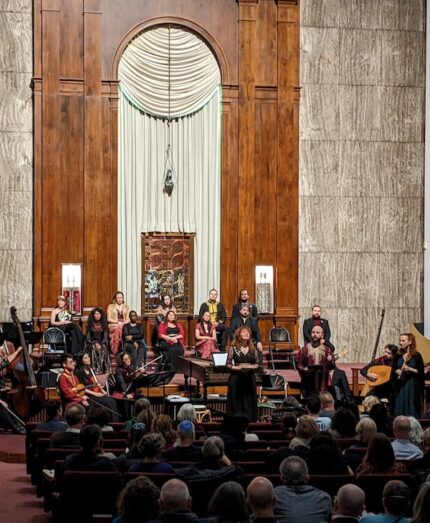Apollo’s Fire wraps Chicago season in lively style with music of exile

When you attend an Apollo’s Fire concert, you know you’re in for a party and maybe even some dancing, along with the eclectic programming.
At the Anshe Emet Synagogue in Lakeview Sunday evening, audiences were treated to just that with a program of music from the Jewish and African Diasporas.
Devised by music director Jeannette Sorrell, this final program of its Chicago season, titled “Exile & Resilience,” draws comparisons between the Jewish and African experiences of being forcibly ripped from one’s homeland and longing for Jerusalem, either literally or metaphorically. As Sorrell explains in her program notes, “both of these groups have developed incredible resilience—the power to find joy in tiny neighborhood rituals. They found much of this resilience through their music.”
The resulting program displayed a great variety of musical styles, eras, languages, and moods. The concert was broken up into seven sets with selections blurring into one another within each set. This often led to an interesting juxtaposition of styles, such as an African-American spiritual accompanied by plucky baroque continuo. This concept also showed the stylistic similarities between seemingly distant musical traditions, such as the prominence of improvisation and embellishment.
Though the program was billed as the music of the Jewish and African Diasporas, there were only three pieces from the African diaspora out of the two dozen total selections. This was a bit of a missed opportunity, as the audience only got to hear soprano soloist Ashlee Foreman and baritone soloist Charles Wesley Evans a few times. But in their few step-out moments, both left an indelible impression. Evans gave a heartfelt rendition of the spiritual “Nobody Knows the Trouble I’ve Seen,” demonstrating a powerful upper register, while Ashlee lent “Oh Freedom!” impressive agility in her pop-inflected vocal embellishments.
There were a number of other impressive vocal soloists on the program singing music that played to their particular strengths. Opening the program, Yiddish singer Polina Shepherd evoked the spirit of the Ashkenazi Jews with a spine-tingling traditional Hassidic song “Avram Avram” (Abraham, Abraham!). Later in the program Shepherd sang an original song, “Keyner veyst es nisht” (Nobody Knows It”) alongside a Yiddish Ghetto Song from 1936 titled “Undzer shtetl brent” (Our town is on fire). The latter was especially effective, as it employed her more even and present chest voice. Her dramatic interpretation was also such that one did not need the translation to understand what was going on in the harrowing song.
The multitalented Daphna Mor impressed with her virtuosity as both a vocalist and instrumentalist. We first witnessed her talents as a recorder player in spritely selections from Salamone Rossi’s Sonate, Sinfonie & Gagliarde. She followed this by singing a haunting Hasidic Passover song, “Karev Yom” (“At midnight the Lord struck down all the firstborn in Egypt”). Here, her warm vocal tone was complemented by the low sonorities of the cello, violin, clarinet, and the lower voices of the chorus. In the second half, Mor returned for a Medieval Hebrew song “Tsur Mishelo akhalnu” (The Lord Our Rock). An open and engaging performer, she invited the audience in by singing with arms outstretched.
Singing in a more traditional style for a baroque concert, tenor Jacob Perry lent his beautiful shimmering tone to selections by Benedetto Marcello in the first half, and later Claudio Monteverdi’s “Nigra sum ed formosa” (I am black and beautiful) from the Vespers of 1610. Perry wowed with his pleasantly gentle upper register, clear-as-crystal coloratura, and deep knowledge of baroque style. In the Monteverdi especially, the runs and ornaments were organic, each textual repetition varied, and Perry demonstrated great dynamic control in the strings of repeated notes.
Rounding out the vocal soloists were tenor Haitham Haidar and baritone Edward Vogel. Both singers were highly engaging and committed performers. In the traditional Sephardic melody “Tsur Mishelo akhalnu,” Vogel’s tone was particularly warm and enveloping. Haidar, a Lebanese-Palestinian Canadian singer, impressed with his musical and linguistic versatility. He sang a Muslim Call to Prayer to beckon the audience back to their seats after intermission, then read a poem in Arabic, sang an Egyptian song by Sayed Darwish, and acted out a delightful skit with Perry during the Sephardic ballad “A la Una yo nací” (At One I was Born).
Underpinning these vocal soloists was a versatile band of instrumentalists, each of whom had their own moments to shine. Concertmaster Alan Choo and violinist Emi Tanabe duked it out in Rossi’s Sonata in Dialogo, each trying to one-up the other in virtuosity. Later, in three traditional Ashkenazi wedding dances, clarinetist Merlin Shepherd displayed a dazzling array of colors and dynamics. The continuo instruments provided supportive accompaniment throughout, skillfully adapting their playing for the various stylistic requirements.
A small chorus formed of the vocal soloists and a handful of other singers also provided support throughout the program. Though they mostly provided simple background harmonies in a few selections, they added a fun visual element to the concert with semi-choreographed dances in the livelier numbers.
Sorrell hopped between different duties as conductor, harpsichordist, tambourine player, singer, and dancer. In comparison to other concerts where her leadership as a conductor is more necessary to keep things together, this program saw her in a more equal role to that of the other ensemble players. Besides her spoken introductions between sets, all she really had to do was allow her able musicians to execute her thoughtfully curated program and musical arrangements.
Apollo’s Fire will be taking “Exile & Resilience” to Cleveland, San Francisco, Palo Alto, New York, London, and Germany. The concert will also be available at home from April 25 as part of the group’s Worldwide Watch-at-Home series. apollosfire.org
Posted in Performances


